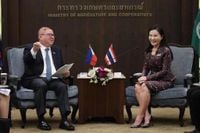On May 8, 2025, Dr. Naruemon Pinyosinwat, Thailand's Minister of Agriculture and Cooperatives, announced a significant breakthrough in agricultural trade relations between Thailand and the Philippines. Following discussions held on February 28, 2025, with H.E. Francisco P. Tiu Laurel, Jr., the Secretary of the Department of Agriculture in the Philippines, Thailand is now set to export frozen poultry products, including chicken and duck, to the archipelago nation.
The Department of Livestock Development confirmed that the Philippines’ National Veterinary Quarantine Service Division (BAI) has officially recognized two Thai establishments—EST. 14 Bangkok Ranch and EST. 79 Panus Poultry—as approved exporters of frozen poultry. This development marks a historic milestone for Thailand, which until now had only been able to export cooked chicken.
Dr. Naruemon expressed optimism about this new opportunity, stating, "This is great news for Thai farmers as we can now export frozen poultry to the Philippines. This achievement aligns with our previous discussions with the Philippines. The Philippines has granted us permission to export raw poultry, pending only the completion of health certificate documentation." He added that the approval of these two establishments is just the beginning, as further certifications for additional facilities are anticipated in the future.
Thailand’s initial capacity for exports from these two approved facilities is estimated at around 5,000 tons annually, with a projected value of approximately 500 million baht. Dr. Naruemon noted that if more facilities receive certification, Thailand could capture up to 25% of the Philippine market for frozen poultry, which is valued at tens of billions of baht.
"This is a significant opportunity for Thai agriculture and farmers, as the frozen poultry market is considerably larger than the cooked poultry market," Dr. Naruemon remarked. "This new market access represents a crucial step forward for our agricultural exports, and we are committed to facilitating this process as quickly as possible."
The positive reception of Thai agricultural products in the Philippines reflects a growing trade relationship between the two nations, particularly in the context of food security and agricultural cooperation. The Philippines has recognized the importance of diversifying its sources of poultry imports, and Thailand's established reputation for quality agricultural products positions it well for this new venture.
In a related effort to enhance Thailand's agricultural export capabilities, Mr. Phichai Naripthaphan, the Deputy Minister of Commerce, has outlined a comprehensive strategy to boost exports of Thai fruits and other agricultural products. During a meeting with various stakeholders, Mr. Phichai emphasized the need for a proactive approach to address market oversupply and enhance pricing for farmers.
He announced that the Ministry of Commerce is implementing seven key measures and 25 action plans to facilitate the export of 950,000 tons of Thai fruits to both domestic and international markets. These initiatives include promotional campaigns to stimulate domestic consumption and partnerships with major retailers to create direct sales channels for farmers.
Mr. Phichai also highlighted the importance of leveraging existing Free Trade Agreements (FTAs) to enhance market access and reduce trade barriers. He stated, "We are working diligently on FTA negotiations with the European Union, South Korea, and ASEAN-Canada, aiming to finalize these agreements within this year. This will enable Thailand to trade with around 50 countries, bolstering our exporters' confidence and opening new markets for Thai products."
The success of FTAs has already been evident, with Thai exports increasing by 17.8% in March 2025, reaching a historic value of 29.5 billion US dollars. This upward trend in exports is crucial for the Thai economy, especially as the country seeks to recover from the impacts of the COVID-19 pandemic.
In addition to expanding market access, the Ministry of Commerce has also revamped the Thai SELECT project to elevate the global profile of Thai cuisine and agricultural products. The initiative aims to certify Thai restaurants abroad, ensuring they use authentic Thai ingredients while promoting the unique flavors of Thai food.
Mr. Phichai remarked, "The Thai SELECT initiative is being enhanced to meet global brand standards, with a new symbol representing the quality of Thai restaurants. This will help us promote our culinary heritage and increase the demand for Thai agricultural products in international markets."
As Thailand embarks on this new chapter in agricultural exports, the collaboration between the Ministry of Agriculture and the Department of Commerce is expected to yield significant benefits for local farmers and the economy as a whole. The successful opening of the frozen poultry market to the Philippines, coupled with the ongoing efforts to boost fruit exports and leverage FTAs, underscores Thailand's commitment to enhancing its agricultural sector and securing its position as a leading agricultural exporter in Southeast Asia.
In conclusion, the approval for Thailand to export frozen poultry to the Philippines is a momentous achievement that not only benefits Thai farmers but also strengthens the agricultural trade ties between the two countries. With ongoing efforts to expand market access and promote Thai agricultural products globally, the future looks promising for Thailand's agricultural sector.


